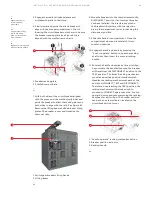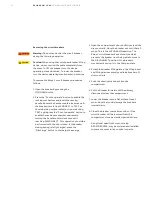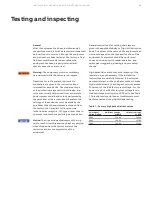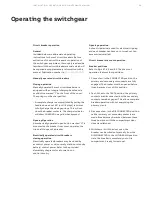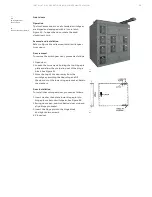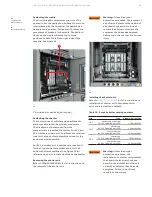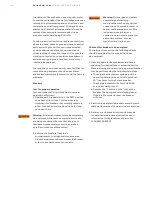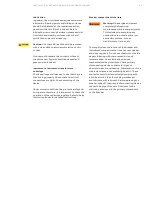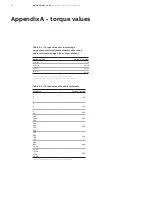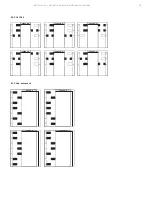
60
I N S TA L L AT I O N , O P ER AT I O N S A N D M A I N T EN A N C E M A N UA L
Wetted equipment
Electrical equipment exposed to water or other
liquids can be extremely hazardous if re-energized
without performing a proper evaluation and taking
necessary actions. Reductions in the integrity of
electrical equipment due to moisture can affect the
ability of the equipment to perform its intended
function.
Damage to electrical equipment can also result
from flood waters contaminated with chemicals,
sewage, oil, and other debris, which will affect the
ntegrity and erformance of the equipment.
Ocean water and salt spray can be particularly
damaging due to the corrosive and conductive
nature of the saltwater residue. Do not energize
equipment that is exposed to flood or other
contaminated water or liquids. Consult ABB Field
Services for guidance.
When equipment has become exposed to non-
contaminated water observe the following points
during maintenance:
• Completely de-energize the switchgear.
• Carefully clean and wipe dry all parts of the
switchgear.
• Use of moving air and heaters is recommended to
facilitate the drying process. When using heaters,
make sure that temperature does not exceed
180° F.
• Replace all fuses.
• Inspect all individual devices for the entrance of
water, dirt, or foreign matter. Consult device
manufacture concerning cleaning, refurbishment
and testing requirements.
• Replace all wetted or flooded sealed devices and
circuit breakers.
• Before re-energizing the switchgear, perform all
inspections defined in this document.
Maintaining the switchgear
Maintenance requirements
General
A periodic maintenance schedule must be
established to obtain the best service from the
switchgear. An annual check of the switchgear
devices and all connections should be made as
a minimum requirement. Equipment subject to
highly repetitive operation may require more
frequent maintenance. A permanent record of
all maintenance work should be kept. The record
should include a list of periodic checks and tests
made, the date they were made, the condition of
the equipment, and any repairs or adjustments that
were performed. Maintenance employees must
follow all recognized safety practices, such as
those contained in NFPA 70B: Electrical Equipment
Maintenance, and NFPA 70E: Standard for Electrical
Safety in the Workplace and in company or other
safety regulations.
Warning:
Solid insulation surrounding an energized
conductor and power apparatus must never be
relied upon to provide protection to personnel.
For specific information regarding the
maintenance of devices, such as circuit breakers,
relays, meters, etc., refer to the separate
instruction book furnished for each device.
Please see 1SDH001000R0002.
Breaker and instrument compartments
Periodic inspection of the circuit breaker is
recommended at least once a year. More frequent
inspections are recommended where severe load
conditions, dust, moisture or other unfavorable
conditions exist, or if the vital nature of the load
warrants it. Always inspect the breaker after a
short-circuit current has been interrupted.
DANGER
WARNING
CAUTION
NOTICE

